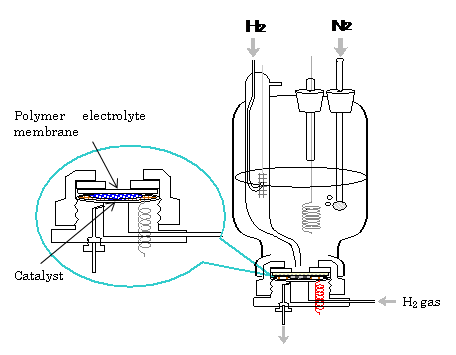
In low-temperature fuel cells, such as PEFCs (polymer electrolyte fuel cells), high-performance electrocatalysts are inevitable both for the anode and the cathode, in order to realize a high power density. Pt has been believed to be the best candidate so far, but the cost and small natural abundance are a drawback for commercialization, and innovation of materials which can substitute Pt are strongly desired. To assure the breakthrough for such demands, new testing methods with high precision and efficiency are very useful that can reduce the cost and time for catalyst screening. The same is true for the membrane-electrode assembly (MEA) tesitng, and a simple but reliable method that can simulate the fuel cell conditions is desired. Also from the point of view of the safety of laboratory experiments, use of inflammable gases shold be minimized.
TFCL is now developing mehods and apparatuses that can solve such problems in material testing. An electrochemical "half-cell equipment" is one of such solutions where the catalyst samples loaded in MEA are tested conveniently in the condition of the gas diffusion electrode. Especially for the catalysts in the cathode, use of hydrogen gas can be avoided that is used in the case of real fuel cell test station, which ensures the safe laboratory testing.
Along with this, TFCL is developing a unique apparatus that enables measurements of minimum amount of samples in a short time, based on modeled reactions in fuel cells. A "fuel cell MEA testor" is another example of a handy testing of components, which may b installed in a fuel cell production line.
Major task of TFCL is serve to the fuel cell industry by developing and commercializing useful measuring apparatuses along with clarifying the phenomena occurring in fuel cells.